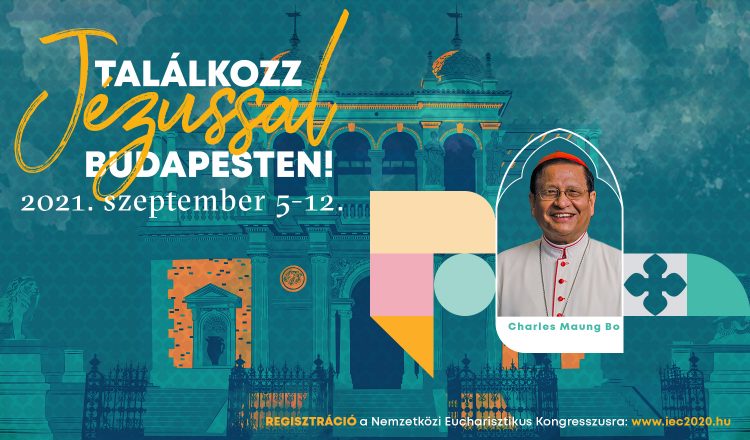
We shall overcome any darkness with the Light of Jesus

“Following the 1962 military takeover the Catholic Church went under persecution, the population was starving, schools were closed down, education denied, while thousands were arrested and imprisoned just for demanding to enforce their fundamental rights; thousands died or disappeared. (…) The country locked itself in. The Catholic Church had to face severe persecution. Missionaries, who had served the poor and the vulnerable were expelled in a single night.” – said Cardinal Charles Maung Bo in his preaching at Westminster Cathedral, London in 2016.
Vigorous Church
Nowadays more than 340 million Christians suffer discrimination for their religious belief. The Burmese Christian communities of the South-East Asian country have been exposed to oppression and persecution for decades by now. Burma’s population amounts up to 53 million, out of which the vast majority practice Buddhism, making it the main religion of the country, while Christians represent a 1 %, and the Muslims some 4 %. Despite its oppression and minority existence, the Catholic Church of Burma has increased even in the most suffocating period. The number of faithful grew from one hundred thousand up to as much as seven hundred thousand. The clergy’s 160 headcount now figures 700, while the number of friars has amounted up to 2000 from the previous six hundred, and on top most of them are less than 40 years of age. “The Church is like a mustard seed – as it is said in the Scriptures – it has grown into a tree” - as Charles Maung Bo worded. The community’s strength is perfectly demonstrated by the fact that already 16 Caritas organisations have been formed to offer help to people in need.
Cardinal Bo urges for national reconciliation
Charles Maung Bo was already a Salesian Aspirantate at the time of the 1962 military coup. He made his First Profession in 1970, and was ordained to the priesthood in 1976. The city of Lashio, where he served as Apostolic Prefect was elevated to the status of Diocese in 1990, and Bo was appointed as the first bishop of the new diocese. In 2003 Bo was nominated Archbishop of Yangoon, then in 2015 Pope Francis created him Cardinal. For two years by now Cardinal Bo is the President of the Federation of Asian Bishops’ Conferences. Cardinal Charles Maung Bo, as papal legate, celebrated the Opening Mass of the 2016 International Eucharistic Congress, held in Cebu, Philippines. Many times he raised his voice and stood for a peaceful coexistence, highlighting his view that the country’s rise lies in the national reconciliation.
Blood, wars, tears
What contradictions cut into pieces the community? The original name of the country was deprived, then renamed from Burma to Myanmar by the military junta in 1989. This territory has already been inhabited since the 9th century BC, it recognises 135 ethnic groups, creating a vicious cycle of violence while making its history troubled and calamitous. The British Empire started to move into the land of Burma in 1824. In 1937 the Burmese territory was wrested away from British India and became a colony of Britain with a certain degree of autonomy. Even so the Burmese independence movement sparked an uprising against the British rule, still it was defeated and responded with a bloody retaliation to the national aspirations. Since during World War II. the Japanese promised the opportunity of an independent state, so to gain support in expelling the British, the Burmese nationalist started organising their own army. Nevertheless, the Japanese troops invaded and occupied Burma, and it soon became clear that everything the Japanese had said about independence were empty promises only, prompting the communist forces to start a battle against the new invaders.
Isolated behind a bamboo curtain
By 1945 the British took back power over their colony. Following long years of discussions, and as the result of the British- Burmese agreement, the independent Union of Burma was proclaimed in 1948. Upon the 1962 military coup all the power fell into the hands of the army leaders. The revolutionary council inaugurated the Burmese Way to Socialism. While Europe was separated by iron curtains and walls, Burma was closed off to the rest of the world by a bamboo curtain. The country’s decline began. In the year of 1987 anti-government riots started again. Parliamentary elections were held in 1990, but the result was ignored by the military junta. In 2007 the abolition of fuel price subsidies and fuel price hikes triggered a series of anti-government protests that were repressed by the military forces. Just a year later a devastating hurricane hit the country, 13 thousands were reported missing and the death toll of the natural disaster was estimated at tens of thousands.
Live and let live!
The military rule remained in power until 2011, while, pursuant to the constitution, a slow process of democratisation started. General elections were held in 2015 that was won by the famous Aung San Suu Kyi, having already been awarded with many international prizes. Though her party was the winner, still the military forces kept their significant influence.
In February 2016, after 55 years, a freely elected parliamentary session was convened again, of which Cardinal Charles Maung Bo hoped for peace, national reconciliation and strengthening the country. “We expect the government to recognise the rights of the Church, to build churches and monasteries.” – said the Cardinal. However, despite the Cardinal’s request, the army kept on committing violence against Christians.
Catholics have been disappeared without a single trace
On Christmas vigil of 2016 several members of the St. Francis Xavier Catholic community disappeared after reporting journalists on the state military bombing of their Catholic church. The parish priest fled over the border to China.
In the summer of 2017 Burma was back again in the media spotlight, when the Buddhist majority launched merciless offensive against the Rohingya Muslim minority, prompting an exodus of some 700 thousands Rohingya to the neighbouring Bangladesh, to escape from the bloodshed. The country’s then leader (official title was State Counsellor) Aung San Suu Kyi had lost the support of many countries on account of the Rohingya genocide. In 2021 she was removed from the head of government by a military coup. Since then protests have been going on, and some hundred have died in the clashes since February.

Arms are useless
The eight hundred thousand Catholic population of the country’s 54 million inhabitants live in a constant daily threat. Charles Maung Bo, Archbishop of Yangoon and the first Cardinal in the history of Myanmar definitely stands for peace and the community. Pope Francis elevated him Cardinal in 2015, so as to express great sympathy towards the Burmese Catholic community. Cardinal Charles Maung Bo, as papal legate, celebrated the Opening Mass of the 2016 International Eucharistic Congress, held in Cebu, Philippines, where he many times spoke up for the persecuted Catholics. In the very same year the religious leaders of Myanmar made appeals to all the civilian and military leaders urging them to search for reconciliation and peace. Protests and clashes erupted nationwide and have grown steadily as from the beginning of 2021. In the course of the February military coup, the local forces removed the former ruling party, thus power was transferred to the country’s military commander-in-chief. “Arms are useless. Rearm ourselves with reconciliation and dialogue.” – pointed out Cardinal Bo referring to the said February coup.
Let’s step on the path of mercy!
This year on 11th April, on the occasion of the feast of Divine Mercy, Cardinal Bo called on his fellow citizens to reject inhumanity, brutality and engage themselves in acts of mercy. “Way of the Cross” – as Cardinal Bo described this period of fear, violence, starvation and darkness the people of Myanmar are going through nowadays, then added: “We shall overcome any darkness with the Light of Jesus.” On another occasion he asked the nation of Myanmar to pray the Rosary throughout May and to attend the Eucharistic celebration. The military has launched extremely serious attacks in the recent weeks in areas inhabited mainly by Christians, thus thousands were forced to leave their homes. As to Cardinal Bo the only solution is to open all doors and hearts towards each other, since “we are the children of the very same nation. Let us answer to violence with gentleness and prayer. This is the key.”
Pope Francis: “I, too, kneel on the streets of Myanmar”
The photo of an elderly nun toured the world press, as she was walking to the line of a group of armed policemen, kneeled down in the middle of the street to protect the protesters from police brutality. Sister Ann Rose’s courage has been rooted in the Christian redemptive love, making every Catholic proud of her.
Cardinal Bo wrote an open letter to all the people of Myanmar, emphasizing that: “We, as the leaders of the Myanmar Catholic Church, stand by the message of hope. We pray and work for the new Myanmar, so that a new country is reborn from the present tragedy. We desire a Myanmar that ensures equal rights for all of its citizens, enabling us to celebrate each and every religious and racial diversity, while enjoying a true peace. We want a Myanmar where soldiers lay down their arms, relinquish power and do their proper jobs: protect people instead of attacking them.”
Pope Francis has repeatedly raised his voice for the sake of Myanmar. “I, too, kneel on the streets of Myanmar and say: may violence cease. I, too, extend my arms and say: may dialogue prevail! Blood does not resolve anything. Dialogue must prevail.” – said the Holy Father.
Source and photo: Asianews.it, Magyar Kurír










